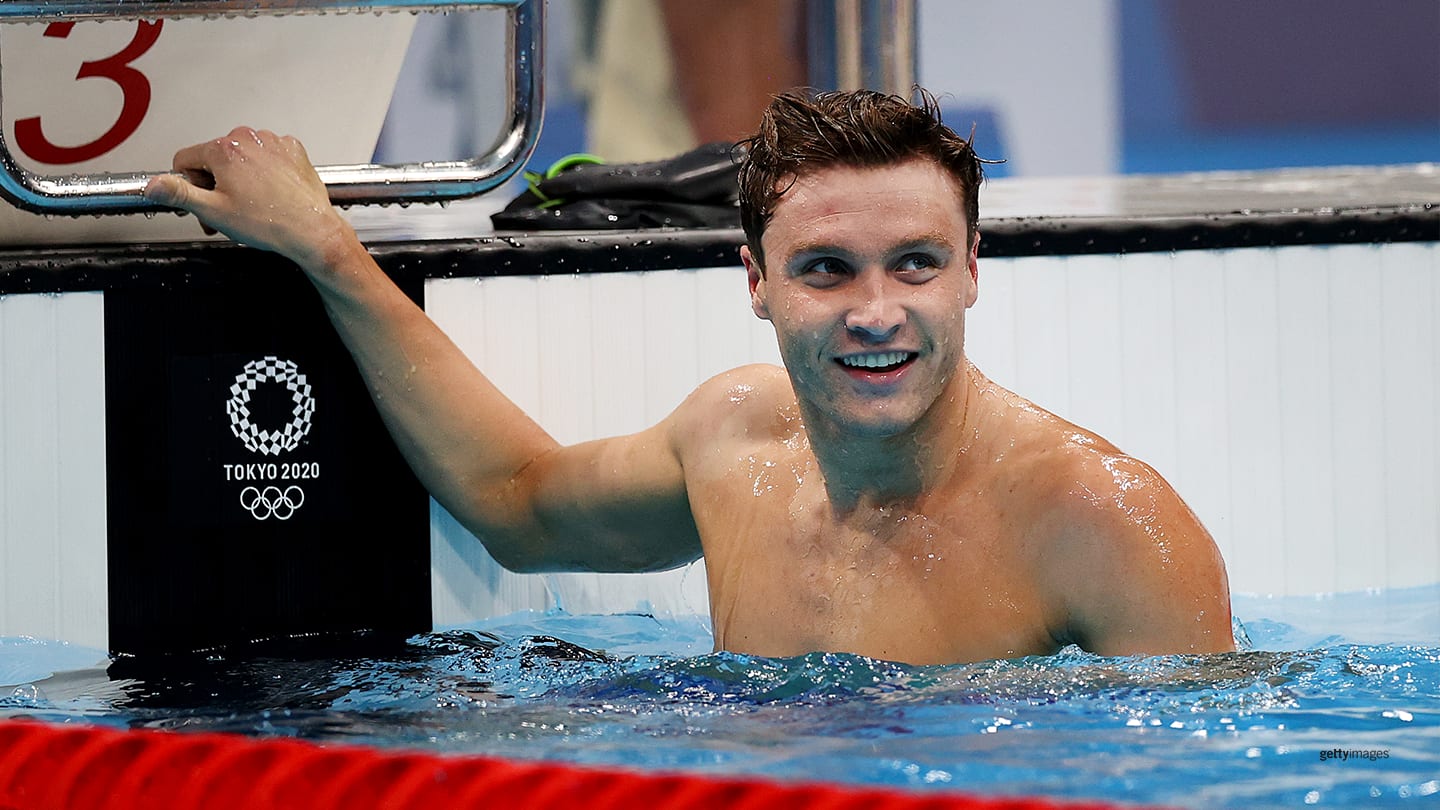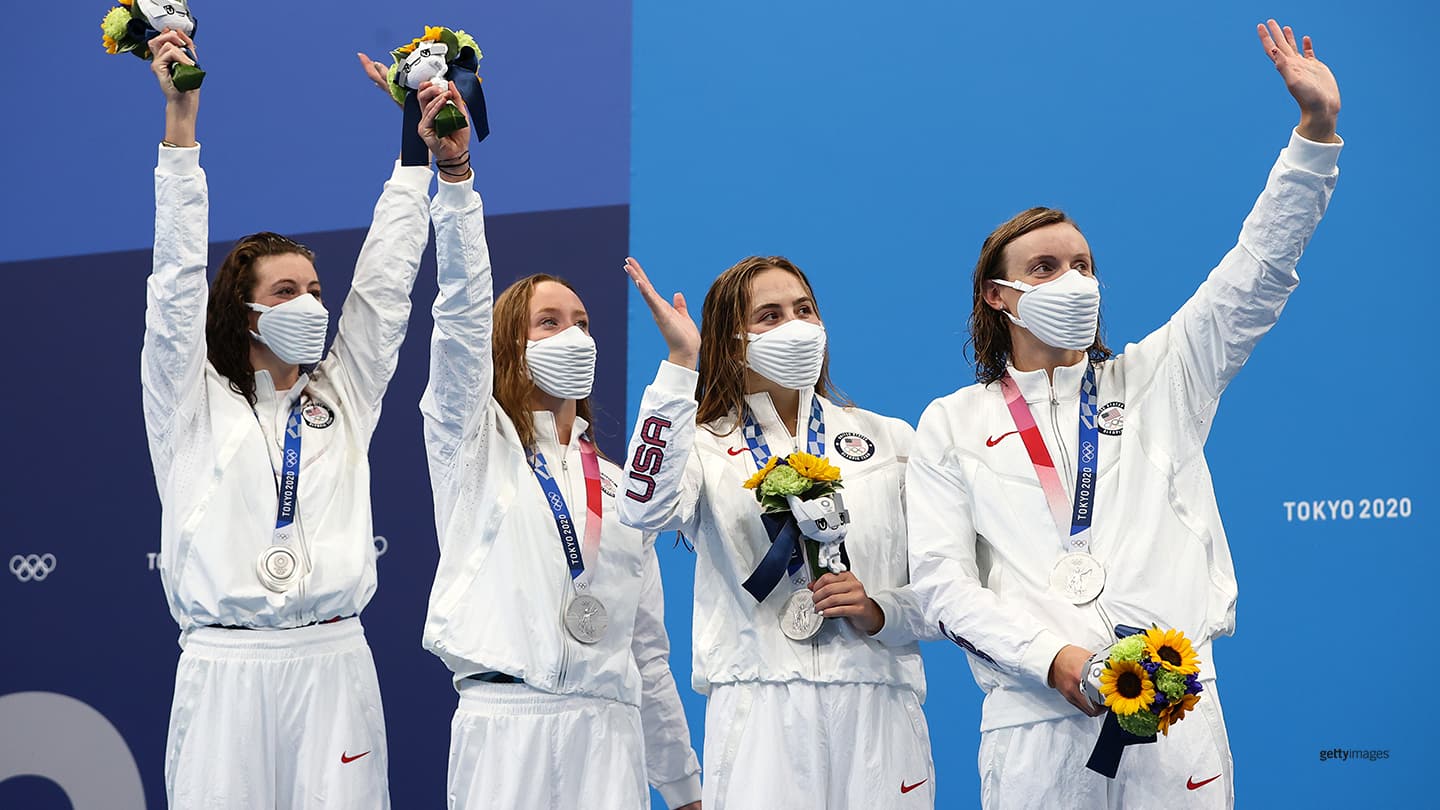
Caeleb Dressel & Bobby Finke Lead Team USA To 5 Olympic Medals In Swimming
by Peggy Shinn

Caeleb Dressel celebrates after winning the gold medal the Men's 100m Freestyle on July 29, 2021 in Tokyo, Japan.
TOKYO — This is supposed to be Caeleb Dressel’s Olympic Games, the one where he becomes one of the next Team USA standard bearers after Michael Phelps’s retirement. With his first individual race, Dressel began to cement his legacy in Olympic Swimming.
In the men’s 100-meter freestyle, Dressel delivered. The 24-year-old sprinter brought home gold — his first individual medal and one of five medals for Team USA on the sixth day of swimming at the Olympic Games Tokyo 2020.
Dressel led the stacked field from start to finish, beating rival Kyle Chalmers from Australia, 47.02 to 47.08, with the Russian Olympic Committee’s Kliment Kolenikov in third. Chalmers, the 2016 Olympic gold medalist in the 100 free, is back from shoulder surgery and still swims in pain. Kolenikov is the 2020 European champion in the 100 freestyle.
Swimming in lane five, Dressel was aware of Chalmers in lane seven the whole race.
“I could actually see him in my peripherals, I knew he was right there,” said the American. “I couldn't see him, but you can see disturbances in the water, and who else would it be besides Kyle, of course?”
This is Dressel’s fourth Olympic gold medal and first in an individual event. He won two relay golds at the Olympic Games Rio 2016 and added a third on Monday when he led off the winning men’s 4x100 freestyle relay. Dressel began competing 13 years ago after watching the iconic men’s 4x100 freestyle relay at the 2008 Olympic Games, where Jason Lezak pulled the U.S. into gold-medal position in the anchor leg.
When asked if this gold medal is different than his relay golds, Dressel said yes.
“It is a lot of different, it is,” he said. “I didn't know. I guess I thought it would be, I just didn't want to admit to it. It's a lot tougher. You can only rely on yourself. There's no one to bail you out or give a bad split. So it’s a lot different.”
Dressel has been gunning for the 100 freestyle world record — 46.91 set by Brazil’s Cesar Cielo in 2009 during the textile swimsuit era. But with training interrupted worldwide by the pandemic, swimmers have, so far, set fewer world records here than at previous Olympic Games.
“I thought I executed well,” Dressel said of his race. “I would have liked to have been out a little bit faster. But I'm happy with seven-o [47.0]. I would have liked to have gone a little bit faster than my PR. But these moments are a lot different than Worlds. I mean, the Olympics has a lot different feel.”
Dressel’s PR (personal record) in the 100 freestyle is 46.96, set at the 2019 world championships.
Seemingly impervious to the pressure that many other athletes have faced at these Olympic Games, Dressel tends to keep to himself at big meets.
“I'm a weirdo,” he joked.
His emotions are near the surface, and he cries easily. So he has steered clear of talking to his wife and family back home to save emotional energy for his races.
But he confessed that the Olympic pressure has affected him this week; he is just “pretty good at putting a face on.”
“Pressure is fine,” he said. “It’s when that pressure, when you turn it into stress, that’s when it becomes a problem.”
His first couple of races at the Tokyo Games, he was stressed but finally felt more relaxed by last night’s 100 freestyle semifinal.
So far, Dressel has competed in two of his six events at these Olympic Games. His program is heavily weighted in the last few days of the meet, and he is favored to win gold in his next four races — 100-meter butterfly, 50 freestyle, men’s 4x100 medley relay, and the mixed medley relay (a new Olympic event).
He has also drawn motivation from watching his U.S. teammates win medals this week, especially other swimmers from his alma mater, the University of Florida.
“Watching Bobby [Finke] win the 800 freestyle this morning, we went to the same college, I’m training in the same city as the kid,” Dressel said. “It’s really special. I was almost crying for him.”

Bobby Finke reacts after winning the gold medal in the Men's 800m Freestyle Final on July 29, 2021 in Tokyo, Japan.
Bobby Finke came to the Tokyo Olympic Games a relative unknown. The 21-year-old college senior is leaving with his name etched in the record books.
In the inaugural men’s Olympic 800 freestyle, Finke surged from fourth place at the 750-meter mark to win an Olympic gold medal in 7:41.87 — one of Team USA’s five swimming medals today.
“I honestly did not expect to win at all,” Finke said, “not even a medal to be honest with you.”
Since 2020 U.S. Olympic Team Trials in June, Finke has steadily dropped his time — from 7:47 to 7:42 in the prelims. Still, he had no idea he could win a medal until the finally 40 meters of the 800.
“I noticed like 10 meters off [the last wall] I was catching a little bit of ground,” said Finke. “That's the only motivation I needed to try and pass and get my hand on the wall.”
He thanked his coaches for “training me for switching into another gear on the last wall.” He swam the final 50 meters almost three seconds faster than any other lap of his race.
Finke surged by Italy’s Gregorio Paltriniero, who won the men’s 1,500 freestyle Olympic gold medal in 2016. Paltriniero had led for most of the race and held on for the silver medal. Finke also got his hand on the wall ahead of bronze medalist Mykhallo Romanchuk from Ukraine.
While the American women have long dominated distance freestyle swimming, the U.S. men have not enjoyed the same success. Finke is the first American swimmer to win a men’s freestyle distance swimming Olympic medal since 1984.
Finke is strongest in the 1,500 freestyle, which he will swim on Sunday. He is the 2021 NCAA champion in the mile (he finished sixth in the 500-yard freestyle at NCAAs).
When asked what it will be like to swim at NCAAs next year as an Olympic champion, Finke said he has not thought that far yet.
“I’m just going to go back home, relax with my family, go celebrate with them and see all my friends and supporters back in Florida,” he said. “Honestly I’m just excited for football.”

Regan Smith and Hali Flickinger pose after the Women's 200m Butterfly Final medal ceremony on July 29, 2021 in Tokyo, Japan.
It was a medal extravaganza for U.S. swimmers in two other races on day six at the Tokyo Aquatic Center.
In the women’s 200-meter butterfly, Regan Smith and Hali Flickinger both won their second medals of the 2020 Olympic Games. In the final 50 meters, 19-year-old Smith passed her teammate for silver with a PR of 2:05.30, while Flickinger held on for bronze in 2:05.65.
“I never really thought I'd make it to the Olympics in the to fly so I'm psyched,” said Smith, who is visibly more relaxed at the Olympic Games than she was at Olympic trials in June.
China’s Yufei Zhang won the 200 fly gold medal in Olympic record time (2:03.86) — the third fastest performance ever.
The U.S. has not won medals in the 200 butterfly since the 2000 Olympic Games, when Misty Hyman earned the gold. The last time Americans won multiple medals in the event was the 1972 Games.
The 2019 world silver medalist in the 200 butterfly, Flickinger was not happy with her race. But she was happy to swim for her country.
“I did get to stand up on the podium and represent the U.S.,” she said. “That’s all that matters here.”

Allison Schmitt, Paige Madden, Katie McLaughlin and Katie Ledecky on the medal stand for the Women's 4 x 200m Freestyle Relay Final on July 29, 2021 in Tokyo, Japan.
Racing concluded with the women’s 4x200 freestyle relay — an event that the U.S. has won five times since its Olympic debut in 1996. This time, however, Australia was favored to win — and break the world record.
The relay world record was broken — by all three podium finishers. But it was China that came out on top, winning the gold medal in 7:40.33, breaking the WR by over one second.
Swimming anchor for the U.S., Katie Ledecky hunted down the Chinese, making up almost a two-second deficit. Ledecky swam her 200-meter leg in 1:53.76, almost one-and-a-half seconds faster than her 200 freestyle final yesterday. And she passed Australia, who won bronze.
“Our coaches always tell us to not do everything the first 100,” explained Ledecky. “But I've had enough experience with that relay to know that even when I try to hold back that first 100, it’s still really fast, and I can still come home.”
The relay silver medal is Ledecky’s ninth Olympic medal. To date, she has earned six golds and three silvers.
Ledecky will compete in the 800 freestyle tomorrow. She is shooting to become a three-time Olympic champion.
Four-time Olympian Allison Schmitt led off the 4x200 relay, with Olympic rookies Paige Madden and Katie McLaughlin swimming legs two and three.
The 4x200 silver medal is Schmitt’s tenth Olympic medal. Asked what it meant, Schmitt broke into tears.
“It’s hard to put into words,” she said, then paused. “Making the Olympics is hard and to win an Olympic medal is even harder. To have a tenth medal with these three other girls, it’s just … I can’t put it into words.
“I know for the world, this past year has been extremely hard. To be here, to swim in the Olympic final and to bring a silver medal back to the U.S., it’s something that I will never take for granted. As you can tell from these tears, I can’t put it into words just yet.”